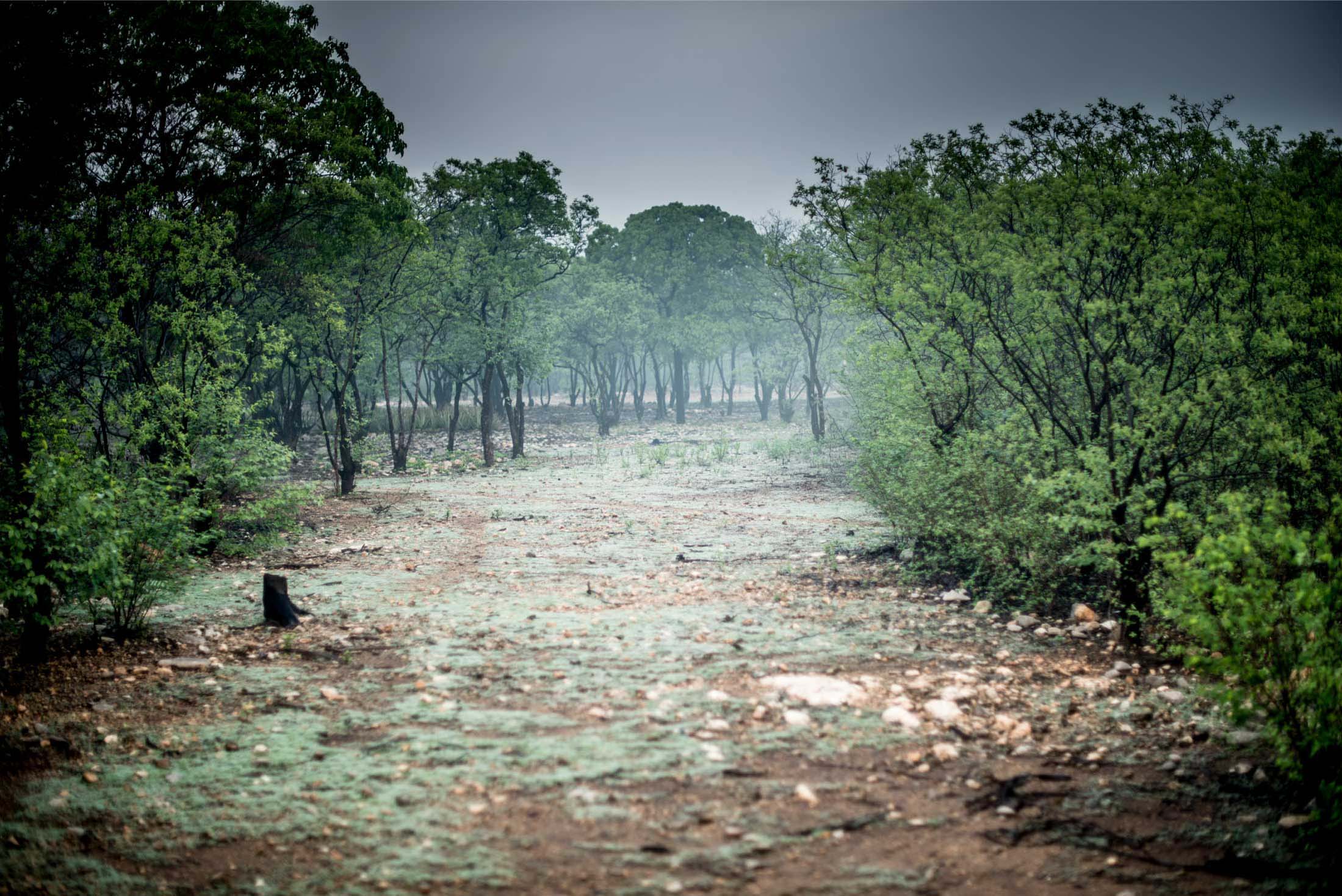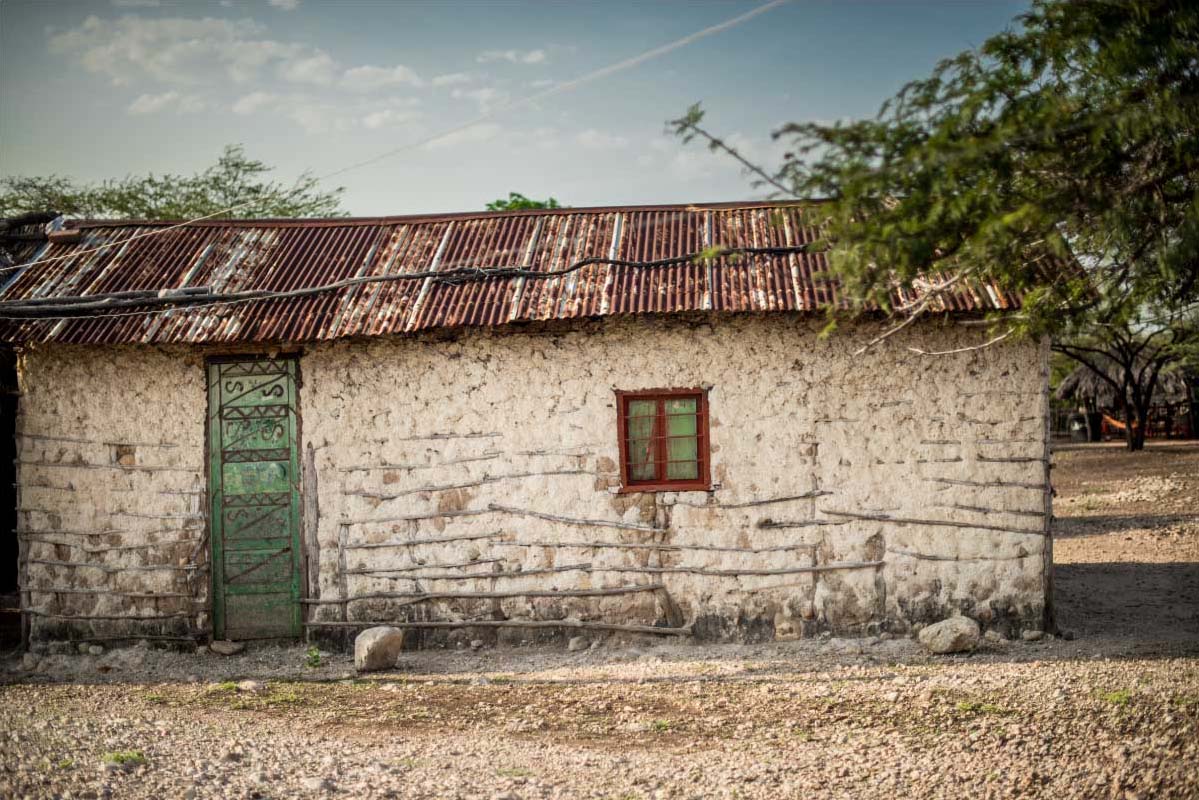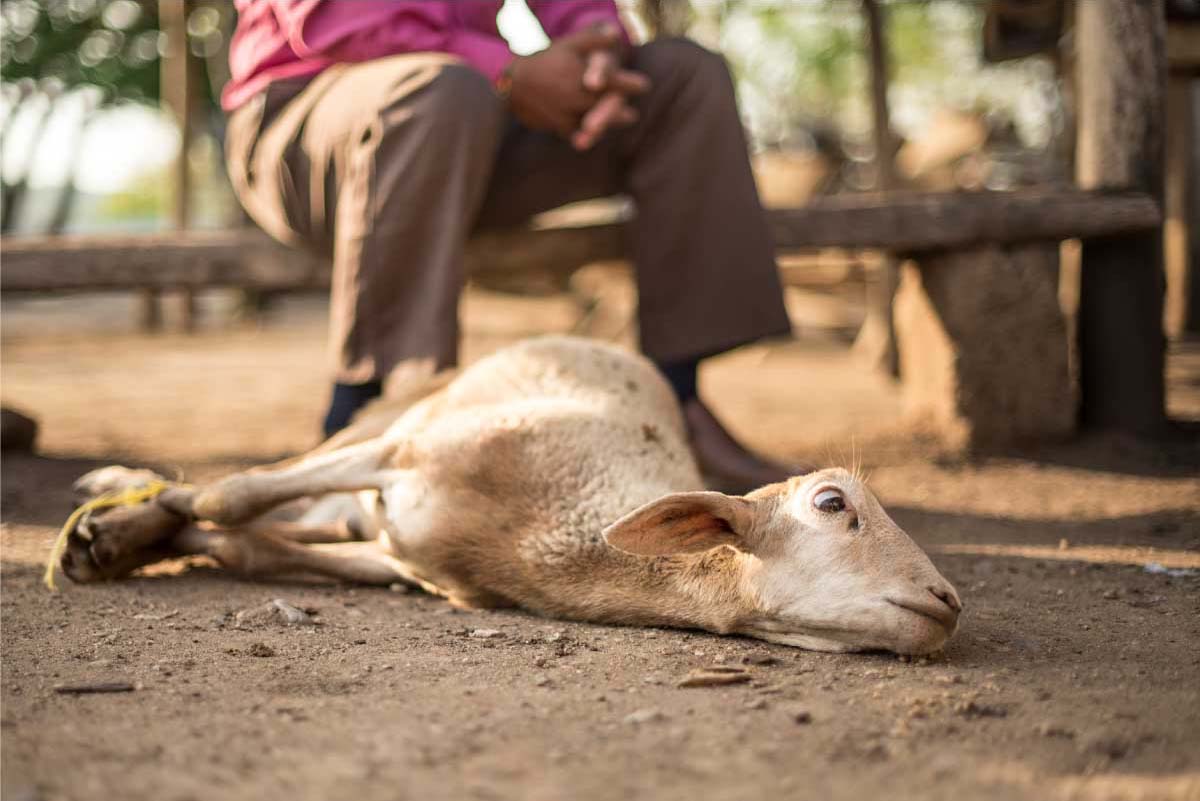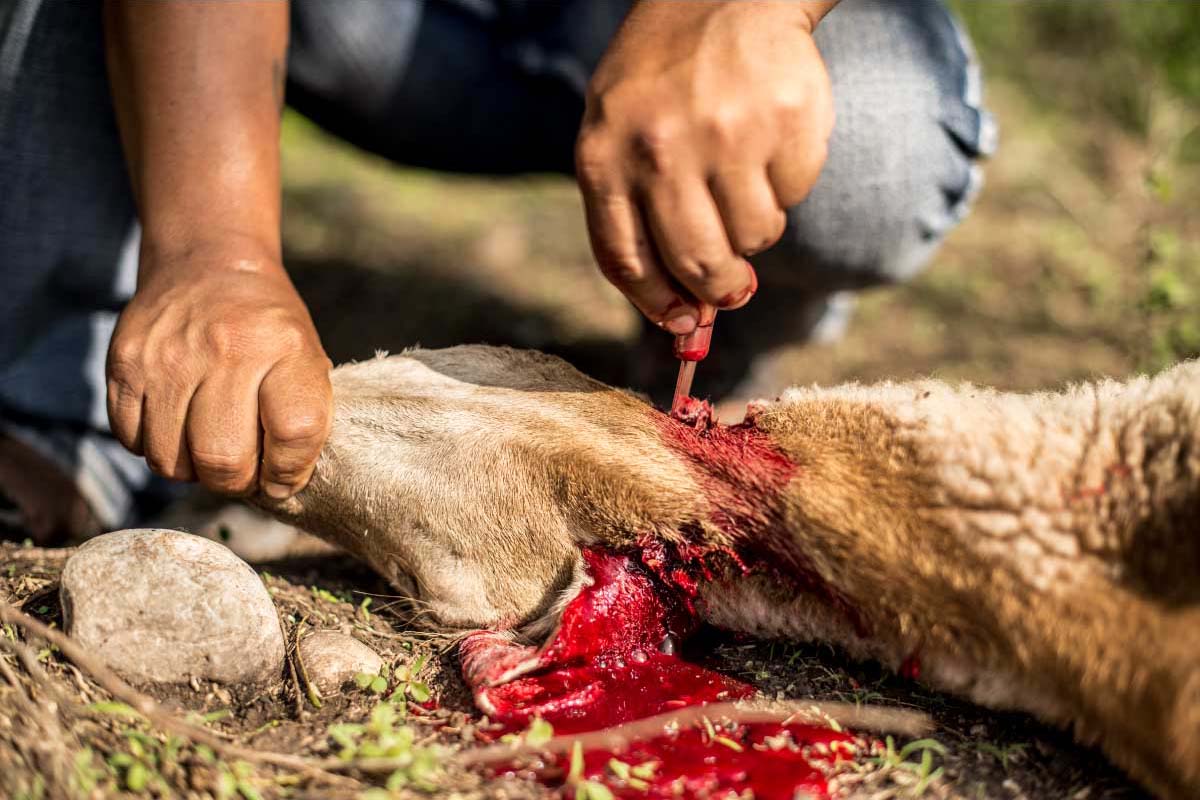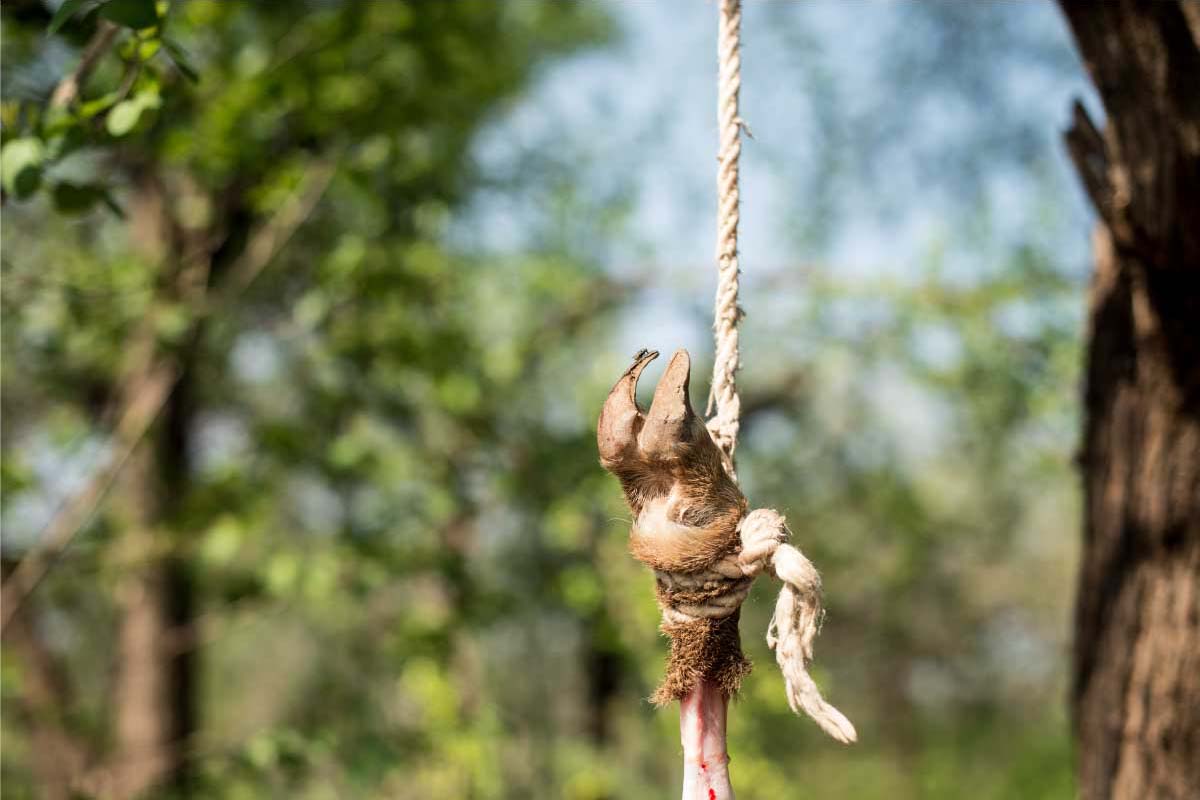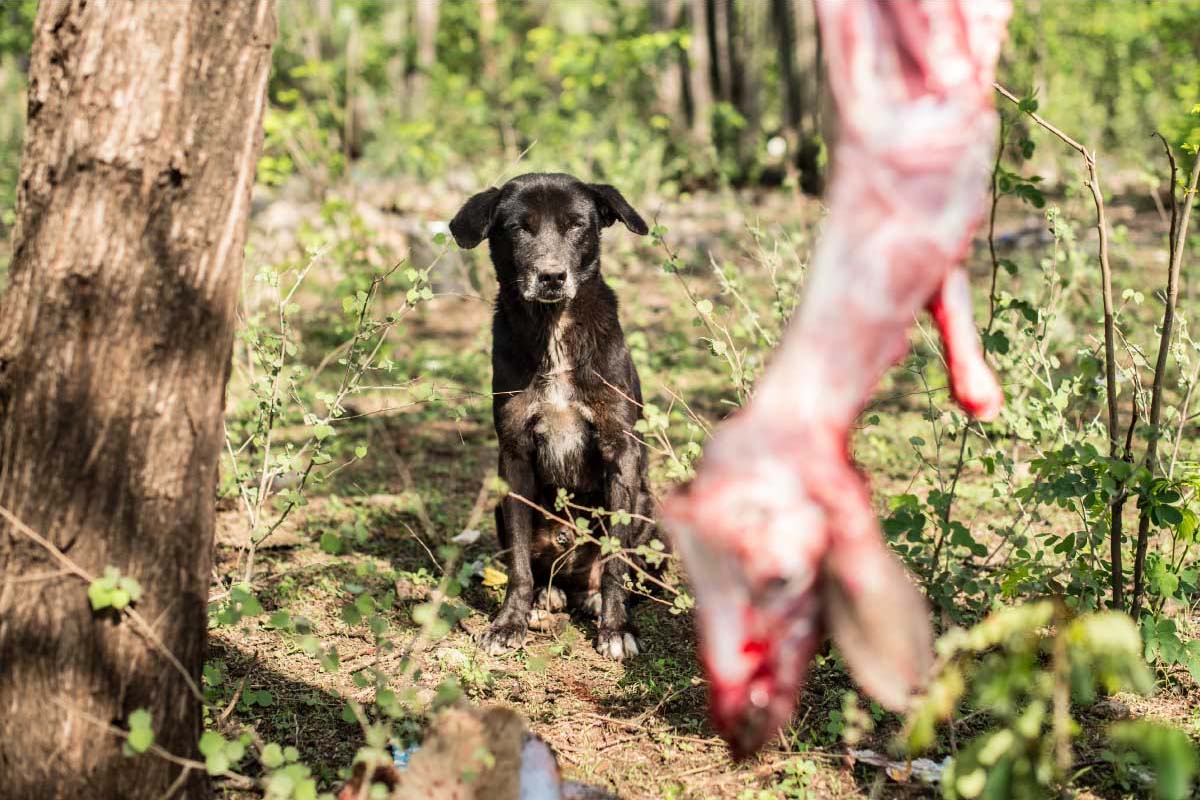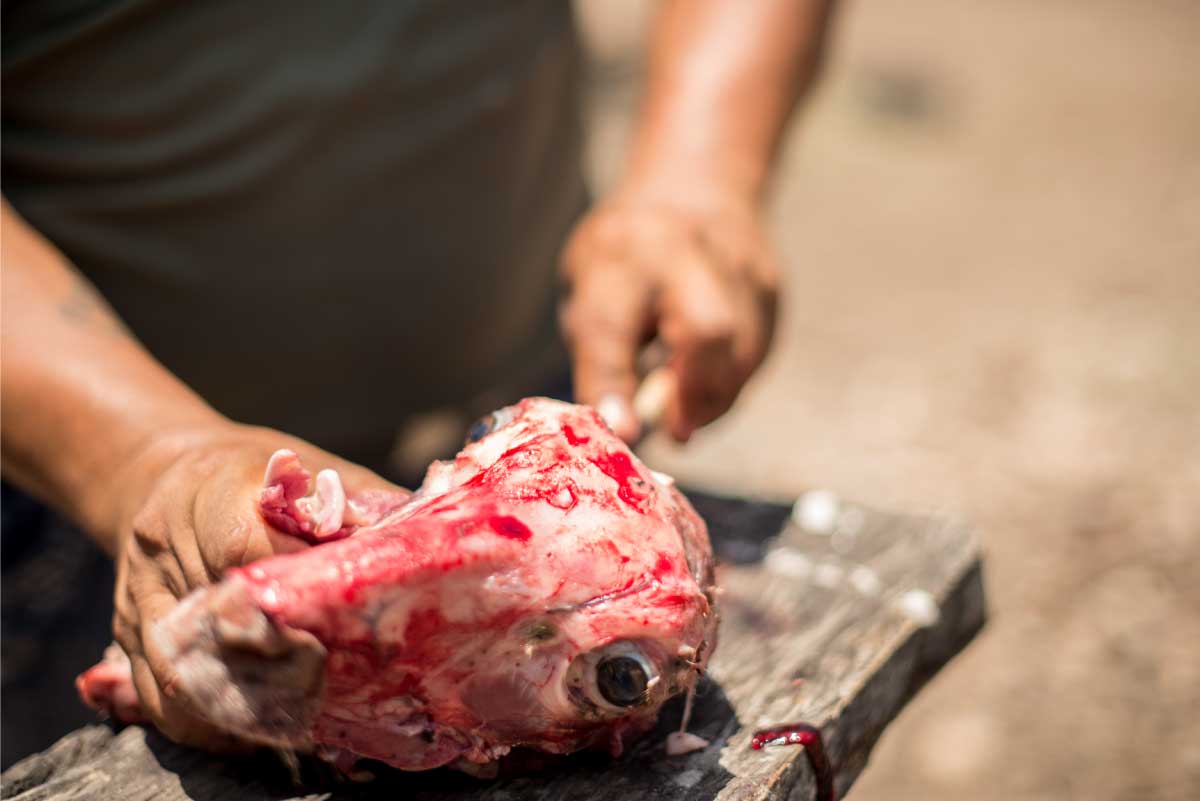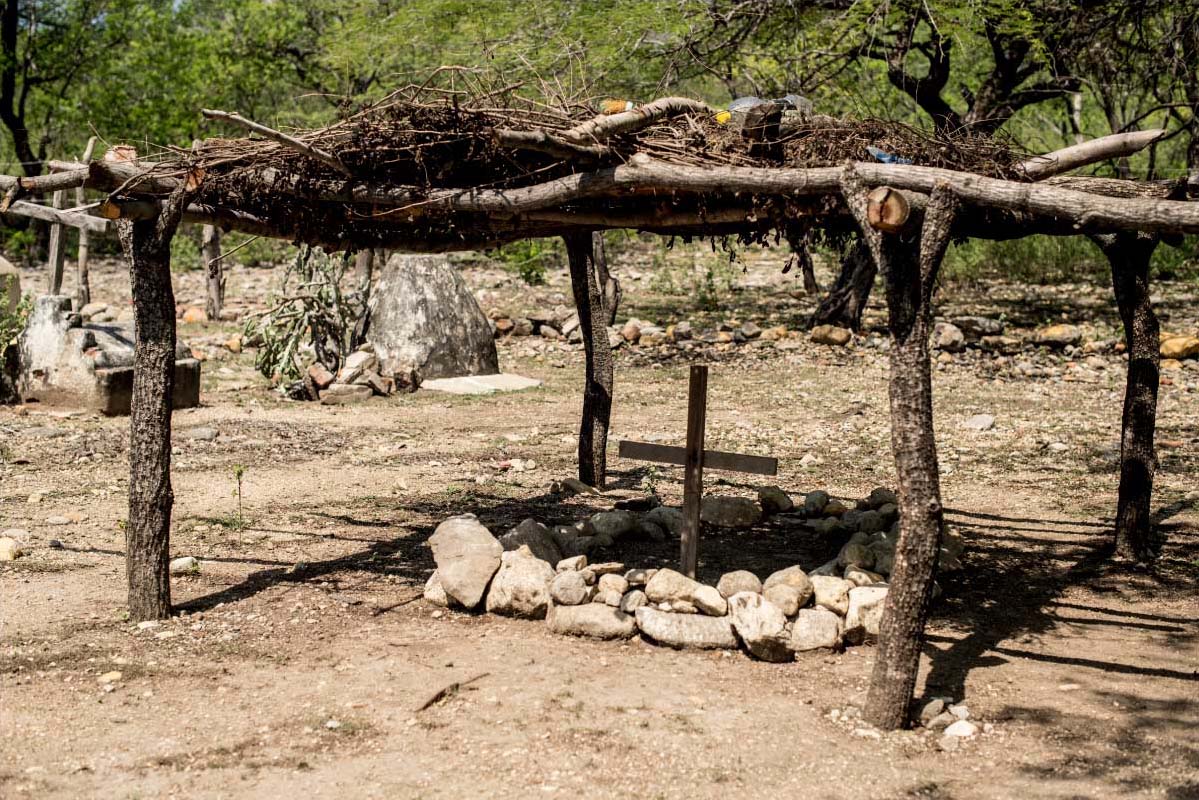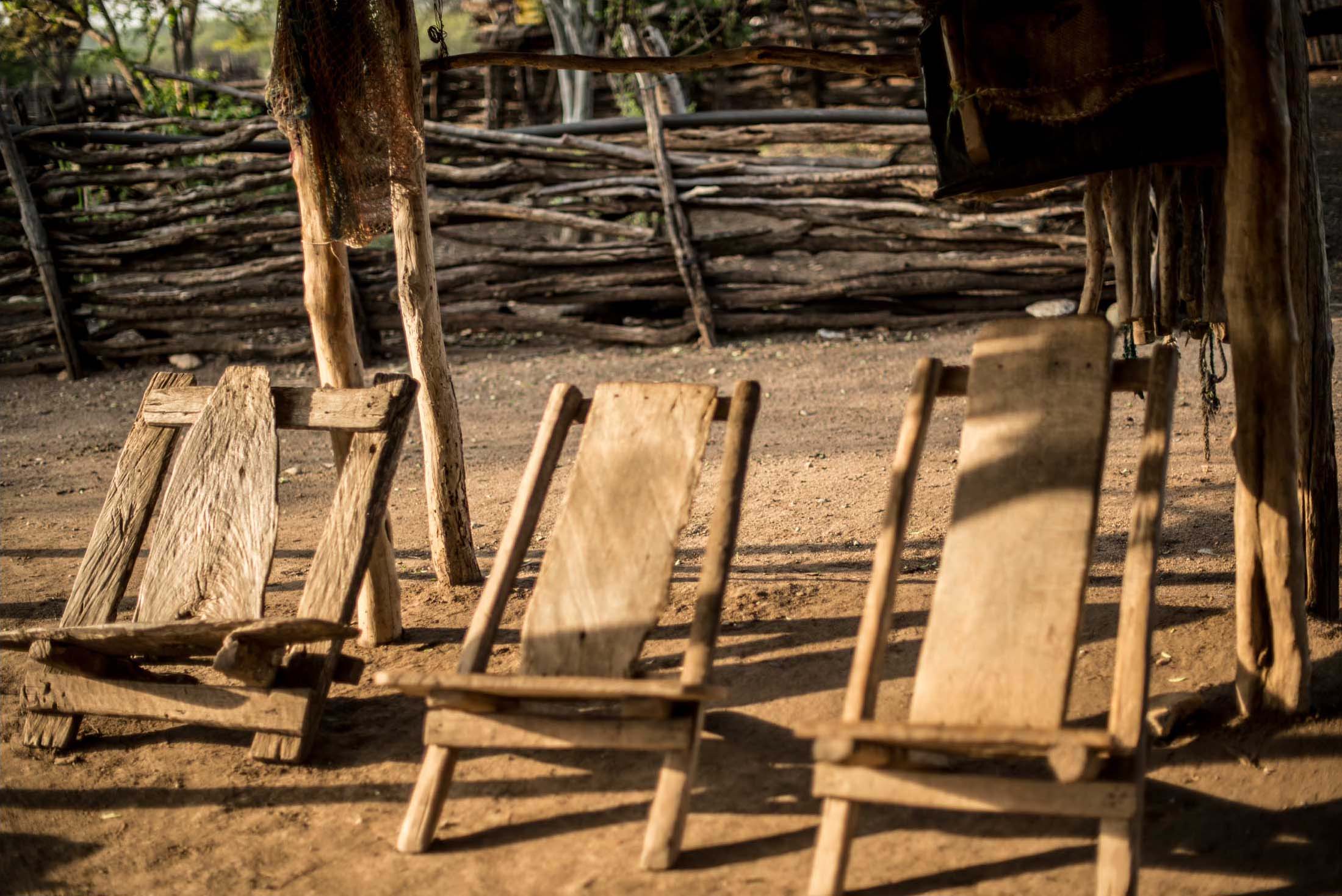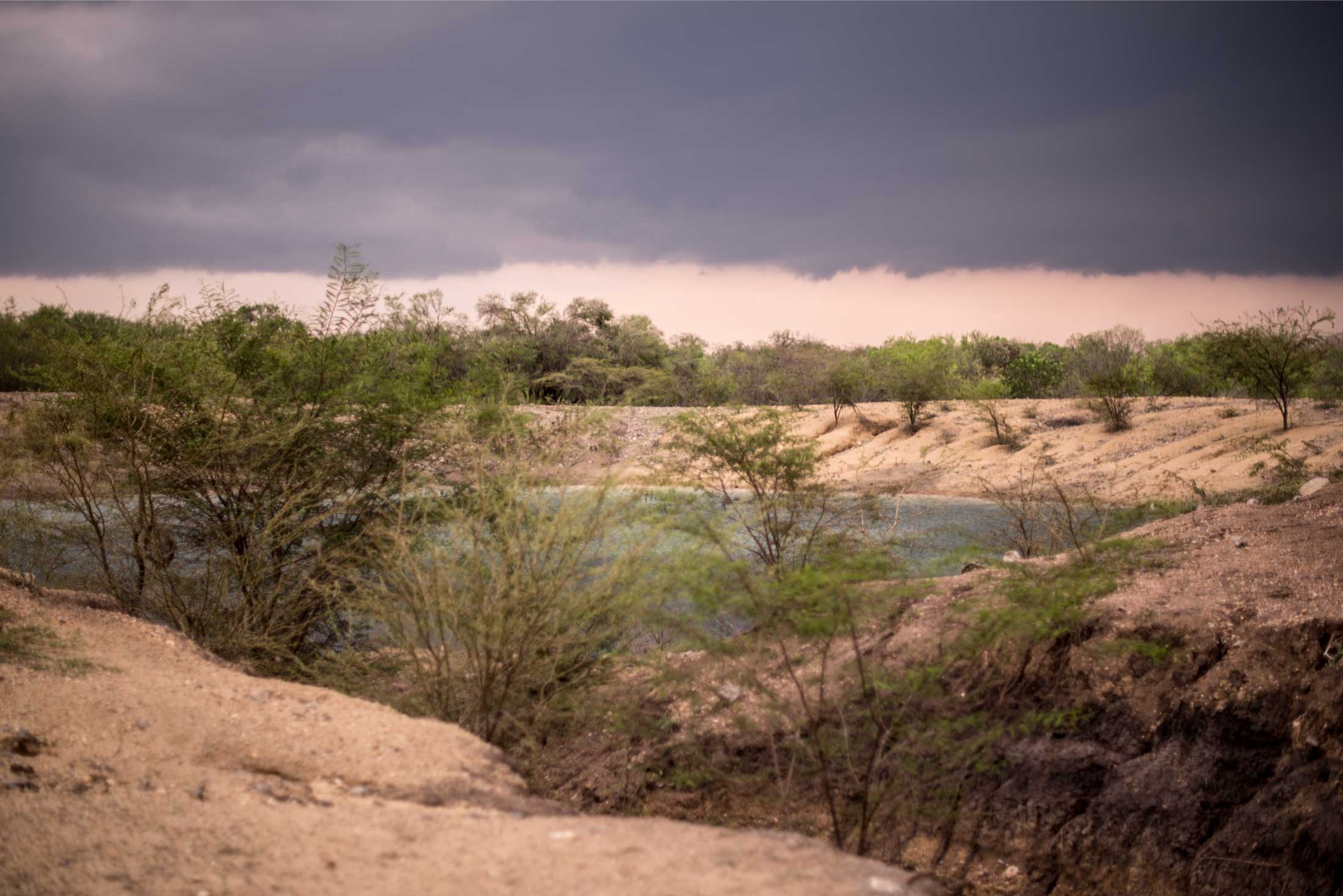Way up, in the northwestern tip of South America, in that chunk of land that spills onto the Caribbean Sea and that forms the ancestral ground of the wayuu indigenous people, there, you can hear how the fat drops of water break when they crash against the hut’s ceiling. It rains in the lower Guajira and three children, under the roof, watch the wet dirt. The sun falls coloring the sky a vivid red and the children, elated at the water that usually doesn’t fall in such quantities in May, or ever in the past few years, jump and scream onto the back of a parked pick-up truck. Two of the children assist the third one, who struggles to come up, dragging the left half of his body, which seems to resist the child’s efforts to move it. When he finally manages to come up, the other two quickly come down. Seconds later, alone and anguished, he studies how to come down to follow the other two. Soon, he gets distracted, drops his head back, and feeling the rain in his open mouth, screams and hits his chest with his closed fists like a small orangutan.
In the peninsula, the indigenous people say that there is a physical world, the world of what we see (anasü), and another world (pülasü), where you can find the yulujas, the shadows of the spirits that have left the bodies of the dead. Between both worlds there is a bridge built by Lapü, the spirit and source of all dreams; through him, those who live in the visible world receive coded omens. The messages talk about those yearned-for rains, the deadly drought that will come, the right place to raise the hut, the war the family will face against another clan, the prosperous life that the newborn swinging in a hammock will have, the tragedies, death.
According to some Wayuu, Lapü is not only the dream of those who sleep. He is also the force that lays down the soul in the Wayuu who are born, and the one who tears it away from those who die.
It is because of Lapü’s violence that sometimes dreamers suffer, but those who don’t dream suffer even more, for only disease awaits them because you could say that those who can’t dream are almost dead. Others, meanwhile, are special. They dream at will, and therefore are interpreters of Lapü. They are Outshi —men—, or Outsu —women— they are shamans, witch doctors. The Wayuu say that whatever Lapü orders, you better heed him, that you must always allow outshi or outsu to go ahead with the acts that were called for to prevent the calamity.
THE BLACK SERPENT
Back then, I was the district attorney of the indigenous reservation, and, since I was the one controlling the lumbering and the hunting, what did the hunters say? That I was cooperating with the Armed Forces; the snitch is José Julián, the one who is connected to the government entities, to corporations, to DAS. That day, my heart was full of fright. I had dreamt of a black snake that was so large that it enveloped me when I knelt, and the outshi came early to my house:
–I had a bad dream, Jose Julián. They are going to kill you. I need a grain of gold, I need a piece of red cloth, I need a red thread, those are the procedures. I will lock you up for five days. And so it went. He sang his rituals, he sang his maracas, and afterwards [he sent me] to sleep, [because] when you go to sleep you receive the power to [make] those who were trying to kill me kill themselves. So they locked me up in a cave, no one can see me, I can’t eat whatever I want, only a well-treated plant. When I leave that cave, he had to do some rituals, thanking the welcome, preventing those griefs.
That took place when the famous paramilitaries were around, when there was an Army presence. Everyone was fighting each other. There was FARC and the guerrillas of ELN fighting, killing each other. In those days you could hear the dogs barking all the time. You couldn’t go out at night. They threw leaflets, they wouldn’t let you go out –it was very ugly. Sometimes, they would hunt down traditional doctors to put an end to them because they realized the power they had, that they are wise men. That is why dreams, like the one I had, must be strengthened, must be fulfilled and heeded. That’s how we have survived those things, and how we have resisted sometimes.
José Julián, a Wayuu from the Uriana Clan. Lower Guajira.
Around 4,000 or 5,000 years ago, very old Arawak men and women embarked on an epic journey starting beneath the Amazon basin. They were hunter-gatherers who traveled in search of new lands. Some of them kept going all the way to what we now call the Bahamas and the Lesser Antilles, while others headed for the Andes in current Ecuador and Bolivia. The walkers became the Arhuacos of Guayana, Barés, Mandahuacas, Birrivas, Guarequena, Puipaco, Kurripacos, and the Yariteros. Those who arrived in the Guajira Peninsula became the Guanebucanes, Coanaos, Anates, Caquetios, Eneales, Onotos, Macuiras, Cocinas, Guajiros, and the Paraujanos. The Guajiros, as the Spaniards named them, the Wayuu –“the people” in Wayunaiki, their language—as they call themselves, took refuge in the arid lands of the northern parts of the peninsula, where they founded their universe of gods and warriors and where they managed to outlast all the other indigenous groups that had settled in that land.
Barbarians, thieves, bandits, worthy of death, without God, law or King –that what the Spaniard authorities said at the beginning of the eighteenth century when they faced off against the bellicose Wayuu nation, which had learned to fight the European settler not only with arrows, but also with rifles on horseback.
The Wayuu, now no longer farmers, became people who hunted sea animals and fished for pearls, also coveted by the alijunas*. They found them on the road of Jepira, or what the settlers called the Cabo de la Vela, a landmass on the coast of the peninsula that, they say, Columbus saw on his third trip, a landmass that, they also say, Amerigo Vespucci named while making astronomical observations. And yet, in the Wayuu universe, the place has always been the road of the dead.
Alijuna: in Wayunaiki tongue, a term used to refer to non-indigenous people.
The Wayuu became herdsmen and the corral became a fundamental element in their ranches. The goat became the family’s and the community’s capital, the money of justice, dowries, inheritances and alliances; the goat became the livelihood of the living and the ritual sacrifice that Lapü asked for in the dreams of outshi like Juan Pablo, who, just like his mother, was born with the gift, with the ability to dream at will, listen to Lapü’s designs, and speak to plants and mountains in order to heal.
Grandfathers like Juan Pablo say that Maleiwa, the great spirit that created the air, the land, and all other things that exist, was the one who built the first Wayuu and organized them in clans. They also say that the grandfathers of the grandfathers spoke of Mma, Mother Earth, impregnated by Juya, Lord of the Rain. Those who speak of Maleiwa say that an iron marked each clan to distinguish them from each other: the Uriana, Ipuana, Jusayú, Epieyuu, Pushaina… Maleiwa also divided the animals: small birds for a clan, the avista for another, the zamuro, the hawk, the serpent, and the tiger –one for each clan, with no tools for the animals, for they are meant only for men. Each animal joined a clan and became its power, its totem. Among the Wayuu, there are those who tread the roads hard, those with the boiling blood, those who live in the stones, those who are tame with a courageous pride, those with the silent breath, those with the feathered bravura, those who change colors, and those with the light feet.
MY TIGER-DOG
One day, I was walking with a man. We were talking and walking through the streets of an abandoned city. On the road, I found a little black dog with curly hair. The dog was friendly. It spread its front legs and hugged my neck. It licked my face over and over again. The three of us kept on walking. The next time I saw the animal, the dog was bigger, its muscles bulged, and he was tall and his body was no longer covered in black hair. Instead, it was covered by iridescent scales. I touched them and some of them came off under my fingers, so, judiciously, I started talking them all off. Under the scales, black, round and elongated spots spread over a vibrant yellow background. A tiger! The dog was now a huge, brawny jaguar, a tigre mariposo, who, just like before, jumped and hugged my neck with its enormous front paws, while its tail with drawn rings fell heavily on the ground. Between the concrete ruins covered by undergrowth, the three of us walked: the man, the tiger, and I.
Ana Karina, alijuna in Wayuu territory, in the Lower Guajira.
The black dog is darkness, disease and an evil spirit, José Julián tells me, translating Juan Pablo’s words in Wayunaiki. You were invited by the chief, a Wayuu from the Uriana Clan who has the power of the tiger. That tiger is the chief. He is the king of the jungle. But the dog is dark. If you cleanse himself, nothing will happen, but if you do nothing, you will have encounters with dark forces. That is because you traveled through sacred sites, caves, mountains, and roads, and now you must cleanse yourself.
That night, under the moon, in the middle of an open field that makes do as Juan Pablo’s backyard, without any clothes on, I heard Juan Pablo’s incomprehensible murmur. I smelled the chirrinche* being spit on my back. I felt the breath of the man, strong and warm against my shoulder blades.
Chirrinche: an artisanal licor made of water and panela (a product made from sugar cane).
Juan Pablo, from the clan of those who watch from the rocks, was born in the desert lands of the Upper Guajira and came down to the Lower Guajira when he was just a child. Back then, more than seven decades ago, he was called Paraipa Ipuana. That was before the alijunas changed his name and gave him and 300,000 thousand Wayuus an arbitrary birth date. In exchange, they gave them an identification card that turned the numerous Wayuu nation in an electoral stronghold for the country’s political forces.
Juan Pablo -Paraipa- remembers that in those old days, there were only seven houses in the reservation, and everyone there had to lead the goats towards the jagüey* so they could drink. They would take them towards the savannah and they would take them back to the corral. He remembers that back then the territory was free, there were no fences, no roads, no train tracks in those lands that were theirs, of the Wayuu nation, those lands that now belong to others.
Jagüey: rain water reserve used by the Wayuu to sustain themselves and keep the herds alive during the long summers.
47 Remains
The doctor is not the only one that dreams. There are others that also dream well. I, for instance, when dreamt about my child because I loved him a lot. My old woman Dolores came to me in dreams. It’s because of her that I am alive. The child was two years old. He was sick. His mom took him to Valledupar, Barranquilla, Barrancas. In the end, they told her: Well, take him away, it’s a chronic disease. Chronic malnutrition. Taker him so that he can die. And then my heart was broken. My only child! I was tired and defeated, and I finally fell asleep at 2 a.m. I dreamt that my grandmother came and Maber was behind her, a little behind her. My grandmother said: José Julián stand up and go down and do what I tell you. The man who affected your child is that man who goes over there, and he must bathe him in chirrinchi and blow his back for three days. Well, still drowsy, I sat on the hammock and stood up. I bathed and brushed. I got to Maber’s at 4 o’clock and knocked on his door.
– What happened, Julian? he said. – I just dreamt about you. My grandmother told me that you were the right person. – Who am I to cure a child? he said and started laughing.
– I don’t know, but that was the order and you have to fulfill it. I brought him [to my house] on my bicycle. He bathed him and blew on his back. On the third day, the child rose to eat. -Maber, tell me from your heart, did you take out 47 remains? – Yes, my grandparents and uncles, to move to them to an ossuary where they store the bones.
It turns out that Maber back then was the second chief and I was the district attorney. We went through the territory together, controlling the goods and services of the reservation, and one day we said: Well, let’s drink a couple of beers. I brought him here [to the house] and the child saw him. And that was when the child got sick, because I was in contact with the man who took out the 47 remains, and gave him the evil eye.
José Julián, a Wayuu from the Uriana Clan, Lower Guajira.
Disease in the peninsula, according to the Wayuu, is the result of the effects that external agents have on the body (ataa) and on what we could call the soul (aa’in). The outsu or outshi ritually takes care of the disease, not of the symptoms, but of the causes of the ailment, which is a product of invisible arrows (kaliaa) that cause the aa’in to come out and wander far from the sick person, abandoning for good in some cases.
There are other ailments that usually prey on the children and that are caused by animals or human beings that are “contaminated” by murder or by manipulating the bones of their forefathers in second burials, a long and complex ritual in which the living say goodbye for good to the dead. If the remains of the dead Wayuu are not extracted ritually, he will stay wandering the desert and become an evil spirit who will bring woe to the people.
THE GOATS AND THE LEAD
I have, more or less, knowledge about dreams, about the dream that becomes real, because my grandfather taught me. I had a very old grandfather and he told me about that. I once dreamt –that was in the organization—I dreamt that I saw some goats, but a lot of goats. Since we were in a war, I immediately thought: Surely there will be lead, be it in our unit or be it in another unit, but something will happen. I told my partner: Sandra, any given day something will happen because last night I dreamt about some goats and that means that we are going to encounter the Army. I know because my grandfather taught me that. And of course, no sooner said than done, three days later, there was a fight with the Army and three guerrilla fighters were killed. Men from the army were also killed, and there were also some wounded.
Albeiro. Wayuu and FARC-EP fighter.
During the journey that the soul takes when the body sleeps, the dreamers from the peninsula have glimpsed the deaths that Lapü announces. The wars that are coming –the dreamers see them like the currents of a river, like tongues of fire that consume an arbor, or like a man who gives birth in dreams, as if his body was a woman’s. Perhaps Juan Pablo, his mother, her mother’s mother, and the ancients, dreamt of the Europeans’ arrival. Perhaps they saw the war for the pearls, the Catholic missions that would come for the souls of the indigenous for their god, and the bodies of the indigenous for a young Colombian republic that worried about its borders. Perhaps they dreamt beforehand the most terrible times of drought; the dry forests that would disappear under the asphalt and the train tracks; the animals that they used to hunt and that died in the enormous pit of the Cerrejón Mine*. Perhaps the dreamers of La Guajira knew that men and women would come down from the mountains with their olive-green uniforms and rubber boots with badges: FARC, ELN, EPL**. Perhaps they also saw the other alijunas that came down: FCW, ACCU*** –more badges, more weapons.
Cerrejón, an enormous, open coal mine that operates in the center of La Guajira.
*FARC (Fuerzas Armadas Revolucionarias de Colombia) ELN (Ejército de Liberación Nación) EPL (Ejército Popular de Liberación). Guerrilla groups that operate or operated in their territory.
**FCW (Counter Insurgency Wayuu Front, for its Spanish initials). ACCU (Autodefensas Campesinas de Córdoba y Urabá.) Paramilitary groups that operated in their territory.
From a reading of the The Road of the Dead Indians, a book published in 1997, which contains Wayuu myths collected by the Michel Perrin.
THE DREAMS OF THE CREATOR
They say that once upon a time Maleiwa, the creator deity, was sad because of his dreams and that he sent for Lapü so that they could be interpreted. He told Lapü that he had dreamt that he was locked up in a house. You will go blind, Lapü said. He dreamt he sucked on sugar cane. Poor you, you will become sick with the flu and chickenpox. He saw a dog and a pig, both frantic and he tried to scare them away. You will have measles. He misplaced his clothes and sash. Your woman will die, Lapü declared.*
It rains in the Lower Guajira and the drops that fall are ancient dead that come back to the land of the Wayuu. They are “yolujas,” souls that abandoned their inert bodies and died again up there, in Jepira, the path that all Wayuu souls must travel to reach the other-world. The yolujas come back also as wanalülüü, evil emissaries from the goddess Pulowi that attack and cause death with invisible arrows.
Those dead caused by the wanalülüü are necessary for, in time, they come to earth again in the form of rain to rejuvenate the grass that the goats will eat –the same goats that will keep alive another generation of Wayuu.
